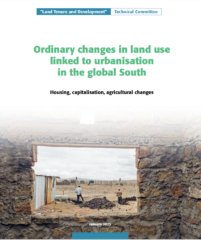
This study looks at the ways in which land use is converted in the South as a result of urbanisation. The various stages in the conversion process are analysed: changes in ownership, acquisition of land rights, transactions, plot divisions, development through building, property development (housing estates, property projects of various sizes, etc.) or fallow land (plots of land that have been demarcated but remain undeveloped). Large-scale conversions generated by major development projects, infrastructure, industry and extractive activities, or large-scale land grabs in rural areas have been widely examined over the last decade.
On the other hand, the way in which residents, holders of local land rights, local economic players, local elected representatives – in short, ordinary players – acquire plots of land and divert them from their previous use with a view to capitalisation, housing or the development of economic activities has hardly been documented. However, this is a large-scale process, which is guided in various ways by the regulatory frameworks and the impetus given by public players, and which remains poorly identified.
These conversions are accelerating under the influence of a number of factors: urban growth on various scales, changes in local legal standards for access to land in rural areas, a surge in rural and urban land markets, the growing power of private and financial players in land and property production, and urban development. The effects are far-reaching: deterioration of the environment, widening of socio-economic inequalities, pressure on family farming and sterilisation of fertile soil, financial risks at many levels, burden on authorities in terms of infrastructure and services.
Regulations are necessary, but given the diversity of the public policy sectors involved, these regulations cannot be based solely on the traditional tools of planning, zoning and protection of agricultural areas. The analyses carried out by the Land and Development Technical Committee suggest a number of avenues and principles that could guide public action, based in particular on improving citizen participation and monitoring, putting in place financial and tax mechanisms to share the land rent associated with conversions so that it contributes to funding local development, and supporting territorial foresight and planning initiatives.
